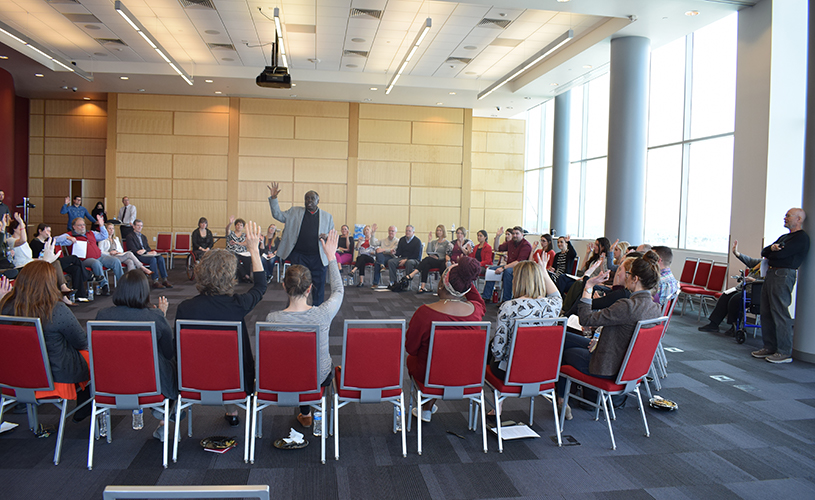at the University of Utah
Handling difficult conversations in the classroom
It’s no secret that the professional and academic worlds are full of difficult conversations. Whether it is related to race, gender equality, politics or a similar topic, people will confront these discussions in shared spaces, and the David Eccles School of Business is no exception.
While these difficult conversations can arise, there are ways to effectively address them in an academic space to create a positive, and altogether unexpected, learning experience. That’s exactly what the Transforming Classrooms into Inclusive Communities team, known as TCIC, set out to do during the end of the Spring Semester. They met with Eccles School faculty and staff help them identify biases and learn how to navigate these difficult topics in an effective way.
Participants met in a large group and began to dissect their own prejudgments and personal biases. Then, breaking into small groups, they began to analyze their “pet-peeves” to determine how those actions affected their own behaviors. Meeting back together as a large group, they walked through an extremely relevant and timely role-play scenario of how to address sexism in the classroom.
In the scenario, a member of the TCIC team acted as a professor who was confronted by a “student” who referred to professional women as girls. The professor demonstrated two less-effective ways to address the conversation, from trying to ignore it to allowing a confrontational argument between two “students” before demonstrating how the conversation should really be handled.
In the effective example, the “professor” pivoted from his lecture to help the student understand how the story could be viewed as sexist, as well as helped them find ways to accurately depict the example without making anyone uncomfortable or upset. It demonstrated how empathy for his students and a willingness to address a difficult subject could produce a positive result in the classroom.
The Transforming Classrooms into Inclusive Communities team is a University of Utah organization that helps other campus entities address diverse communication issues in their classrooms and workspaces. Professor David Derezotes, along with other faculty fellows, have three main goals through these workshops:
- “Transforming the often difficult classroom conversations (about such topics as race, gender, politics, religion, sexual orientation, etc.) into learning opportunities that fit with existing class objectives.”
- Working to uncover and heal the hidden biases that most of us have about other people.
- Helping to transform our classrooms, campus, and local neighborhoods into inclusive communities where members value diversity, hold mutual respect, share power and resources, and promote social justice.”
While the conversation may have forced faculty and staff to leave their comfort zones to address some of these topics, the workshop was successful in giving them the tools they need to create positive learning outcomes in their academic environments when confronted with them.
Pictures of the event are available on Pixieset.





